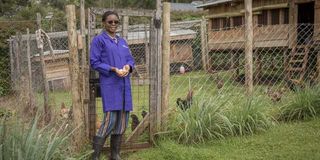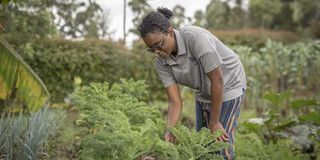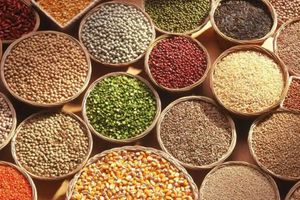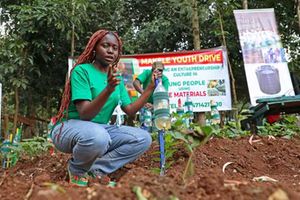
Sheila Kahaki Kemboi, a small-scale farmer, poses for a photo outside her poultry farm located in Kericho County while displaying samples of eggs she has collected from the poultry house.
When the government announced lockdowns to minimise the spread of Covid-19 in 2020, Sheila Kahaki Kemboi’s world almost collapsed.
The Kenyatta University biochemistry graduate had just switched careers after working in a water treatment company for 10 years to try a hand in organising events.
With lockdowns and almost no social gatherings, her new passion faced challenges.
Despite not having a source of income, one thing was clear to Kahaki, just as it was for her husband – how to put food on the table. They thought of growing their own food.
The couple left Nairobi for Chepseon village in Kericho County. The decision helped slash monthly bills like rent and marked the genesis of a farming chapter.
“The joy of farming is growing one’s own food. There is a satisfaction that comes with knowing that at the end of the day, I have food on the farm. When you put something in the ground, observe it grow and harvest, you say to yourself that this is beautiful,” Kahaki tells Seeds of Gold.
She proudly introduces herself as an entrepreneur and a small-scale farmer, thanks to the different crops she grows. Kahaki also keeps chickens for consumption and sale.
“I grow indigenous vegetables, white and red cabbage, broccoli, green pepper and spring onions in small portions,” she adds.
Horticulture comes with its share of challenges. There are times Kahaki and farmers in the region harvest a lot of vegetables, affecting market price. She plans to invest in irrigation in order to produce more food even during dry periods.
“The challenge with being a smallholder farmer is that we depend on the market and locals to determine the price of our produce. You can sell cabbage for Sh30 this week and days later, the price falls to Sh10. During dry seasons, the same cabbage can go for as much as Sh100,” Kahaki says.

Sheila Kahaki Kemboi, a small-scale farmer, tends to some of her vegetables.
As the vegetables satisfy her family’s food and financial needs, Kahaki maintains the poultry venture she started five years ago.
She began with 100 day-old improved kienyeji chicks. On maturity, she sold the chickens and replaced them with pure indigenous birds due to their high demand.
“The good thing with indigenous chickens is that the more a hen hatches eggs, it continues laying. That ensures continuity of the poultry venture. I can sell some of the eggs and chicks at different stages,” she says.
Kahaki, who was born and grew up in Nairobi, says she never thought of engaging in crop or livestock farming.
She says kienyeji birds are easy to rear, especially when one applies the free-range system.
They are in high demand because of their tasty meat that is as a result of what they feed on.
“We feed the birds but also allow them to wander about in search of worms and insects,” she says.
“Many people prefer free range chickens and their eggs. There is demand for cockerels throughout the year. I keep the cocks and sell them when they reach maturity. Some customers make orders when the birds are just days old,” she says.

Sheila Kahaki Kemboi, a small-scale farmer, poses for a photo outside her poultry farm located in Kericho County while displaying samples of eggs she has collected from the poultry house.
She grows maize on an acre while a quarter an acre is dedicated to the vegetables.
“We make seedbeds for carrots and other crops. Crop rotation maintains soil health,” she says.
Kahaki attributes her farming success to the gradual steps she took, consistency and curiosity to try new crops.
On realising that she could dictate the market prices for cabbage, green pepper and other crops, she planted maize, a staple in Kericho.
After harvesting, Kahaki dries the maize and stores it until prices favour her.
Her biochemistry background comes handy as she uses technology to improve harvests. The changing weather patterns means seasons are no longer determined by the old farming calendar.
“I apply crop nutrition knowledge on the farm. When it comes to improving soil fertility, for instance, I am keen on the nutrients in the fertiliser and their rations. I know why plants need calcium, manganese and other elements. That is how the chemistry bit comes in,” Kahaki says.
She uses a FamCare app on her phone for accurate weather forecast in Kericho. The technology also helps her reach out to agrovets for advice on the right products, saving Kahaki the struggles and expenses of travelling long distances.
“I log into the app for weather updates mostly. It helps in planning as I know exactly when to expect the rain. With that, I can prepare the land and buy whatever is needed for planting,” she says.
“The app also guides me on topdressing, fertiliser application and other farming practices.”








